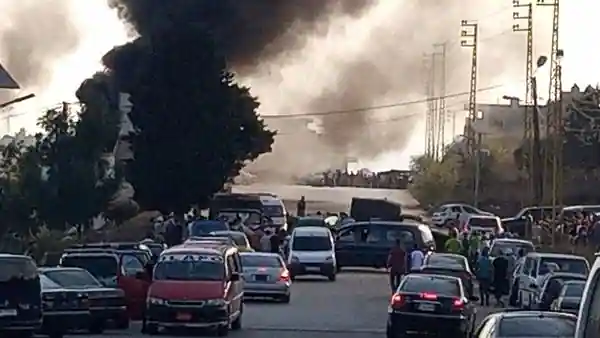A warehouse containing illegally stored fuel exploded in northern Lebanon early Sunday, killing 28 people and injuring dozens, as the Mediterranean nation grapples with a severe fuel crisis during an economic collapse.
Before the 60,000-liter fuel tank stored in a warehouse in the town of Tleil near the Syrian border exploded, residents in the area had gathered to collect gasoline, triggering a stampede, according to Lebanese state media.
The Lebanese Red Cross said it had recovered 20 bodies from the town, along with 79 injured people and was searching for more casualties. The Lebanon Health Ministry later increased the death toll to 28.
Pictures from the scene circulating on social media showed bodies charred beyond recognition and patients at hospitals wrapped from head to toe in bandages.
The fuel in the warehouse had been seized by the Lebanese armed forces trying to stop smuggling and the black-market trade of gasoline, which has become scarce in Lebanon.
Lebanese authorities said it wasn’t known what caused the explosion and that they were investigating the cause. The Lebanese army said it had been distributing the fuel to local residents. After the army left the area in the early hours of Sunday, people gathered to collect fuel, according to state media and an internal security report from the United Nations based on local sources.
It wasn’t known how much fuel was left in the tank when it ignited. The army said it had arrested the owner of the land where the fuel had been confiscated by the army.
Lebanon is in the midst of a severe fuel crisis and one of the worst financial collapses of the past century.
Lebanon has for decades suffered electricity cuts due to mismanagement and corruption, but in recent weeks, the entire country has been mostly without power, as the economic crisis has left the government unable to import enough fuel.
Food is left to rot in grocery stores, and professionals in Beirut travel across the capital in search of electricity to charge their laptops and connect to the internet.
In Lebanon’s hospitals, staff scavenge for fuel and water to keep operations running. On Saturday, the American University of Beirut Medical Center appealed to the Lebanese government and international agencies for fuel supplies.
The hospital, one of Lebanon’s most prestigious medical institutions, said fuel shortages could force it to shut down in less than 48 hours, which would endanger 55 patients dependent on respirators, including 15 children, and more than 100 patients on dialysis.
Last August, more than 200 people were killed when a huge cache of poorly stored ammonium nitrate exploded at the port in Beirut, destroying parts of the capital’s vibrant historical neighborhoods.
This story has been published from a wire agency feed without modifications to the text
Never miss a story! Stay connected and informed with Mint.
Download
our App Now!!




